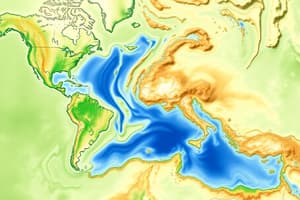Podcast
Questions and Answers
Match the following factors influencing climate with their description:
Match the following factors influencing climate with their description:
Latitude = Distance from the equator Altitude = Elevation above sea level Proximity to bodies of water = Influence of oceans or lakes on climate Prevailing winds = Dominant wind direction in an area
Match the following aspects of human geography with their examples:
Match the following aspects of human geography with their examples:
Culture = Beliefs, customs, arts of a society Economics = Study of production and consumption of goods and services Migration patterns = Movements of people from one place to another Built environment = Man-made structures and spaces
Match the following GIS functionalities with their descriptions:
Match the following GIS functionalities with their descriptions:
Store data = Save spatial information for analysis Visualize data = Present spatial data in graphical form Share data = Distribute spatial information with others Analyze data = Examine spatial relationships for insights
Match the following urban elements with their relevance to human geography:
Match the following urban elements with their relevance to human geography:
Match the following climate parameters with their characteristics:
Match the following climate parameters with their characteristics:
Match the following topics with their significance in understanding human geography:
Match the following topics with their significance in understanding human geography:
Study Notes
Geography: Climate, Human Geography, Geographic Information Systems
Climate
Climate refers to the typical weather patterns that occur over large areas. It encompasses temperature, precipitation, humidity, wind patterns, and atmospheric pressure. Climate varies across regions due to factors such as latitude, altitude, proximity to bodies of water, and prevailing winds. Studying climate is essential for predicting future weather patterns and understanding the impacts of climate change.
Human Geography
Human geography is concerned with the relationship between people and their surroundings. Its scope covers population distribution, culture, economics, politics, and the built environment. Cities and urban spaces, transportation networks, trade routes, and migration patterns are just a few examples of the phenomena studied in human geography. Understanding human geography helps us comprehend how societies evolve and how we inhabit the earth.
Geographic Information Systems
A Geographic Information System (GIS) is a powerful tool for managing and analyzing spatially referenced data. GIS has its roots in cartography and remote sensing. It can store, analyze, visualize, and share data related to positions on Earth's surface. GIS is used across various disciplines, including environmental conservation, urban planning, transportation, healthcare, and emergency response.
GIS software enables users to input, manage, and interpret data from various sources, such as census demographics, topographic maps, satellite imagery, and real estate records. Users can combine data layers, generate maps, and perform spatial analyses to reveal patterns, trends, and relationships. GIS plays a vital role in decision-making, resource allocation, and problem-solving in diverse industries and governments worldwide.
Studying That Suits You
Use AI to generate personalized quizzes and flashcards to suit your learning preferences.
Description
Explore the fundamentals of climate, human geography, and Geographic Information Systems (GIS) in this quiz. Learn about weather patterns, population distribution, spatial data management, and their impacts on our world.




